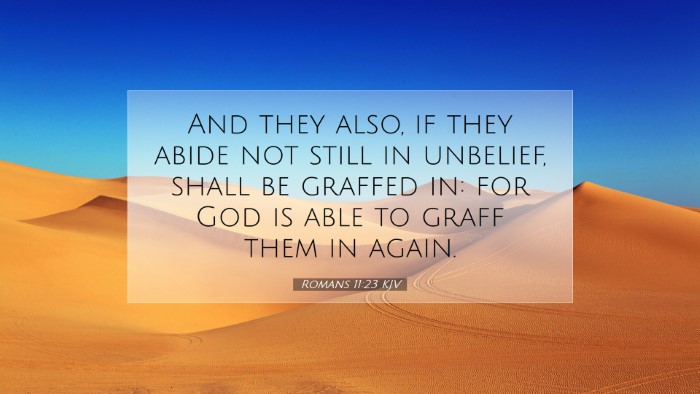Commentary on Romans 11:23
Bible Verse: "And they also, if they abide not still in unbelief, shall be grafted in: for God is able to graft them in again."
Introduction
The Apostle Paul's letter to the Romans is a theological masterpiece that discusses the righteousness of God, the sinfulness of humanity, and the hope of salvation offered through Jesus Christ. In Romans 11, Paul addresses the status of Israel in relation to God's covenant and the Gentiles' inclusion in salvation. Verse 23 highlights the potential for Israel’s restoration, speaking to the theme of God’s redemptive work for all humanity.
Summary of Key Themes
- Encouragement of Faith: It emphasizes the necessity of faith for both Jews and Gentiles.
- Hope of Restoration: The possibility for the Jewish people to be reconciled and grafted back into God’s redemptive plan.
- God’s Sovereignty: Affirms God’s power to redeem and restore according to His divine will.
Commentary Insights
Matthew Henry's Commentary
Matthew Henry elaborates on this verse by stating that God’s grace is abundant, and His mercies are deep and unsearchable. He argues that the phrase "if they abide not still in unbelief" underscores the conditional aspect of their restoration. Henry notes that while the Jews had been cut off due to unbelief, they had not been permanently rejected. If they repent and turn back to God in faith, they can be grafted in once more. This implies an open invitation from God, revealing His character as loving and patient.
Albert Barnes' Notes on the Bible
Albert Barnes highlights the idea of being "grafted in" as a metaphor drawn from horticulture, where branches from one tree are inserted into another tree to grow and bear fruit. He emphasizes that God is fully capable of restoring Israel, just as He has brought the Gentiles into His fold. Barnes stresses the pivotal role of faith—nonbelievers can become believers and regain their status by embracing the gospel. This passage serves as reassurance to believers of the power of faith and the willingness of God to restore.
Adam Clarke's Commentary
Adam Clarke provides a thorough examination of the Greek terms used in this verse. He underlines that the phrase “graft them in again” indicates not just the possibility but the expectation of their return if they choose to reject their unbelief. Clarke emphasizes that the historical context of Israel's disobedience does not negate God’s ultimate plans. Clarke also draws attention to God's omnipotence, asserting that He is able to accomplish what seems impossible, reinforcing the boundless nature of divine grace.
Theological Implications
This passage holds significant theological implications regarding the nature of faith, redemption, and the character of God. It presents a profound truth that God's mercy is not limited to a specific group of people but extends to all who believe. The potential of the Jewish people to be grafted back into the covenant reminds Christians of God's unfailing love and redemptive purpose for humanity.
The Role of Faith
The emphasis on faith in this verse invites reflection on its central role in the believer’s life. The conditional "if they abide not still in unbelief" serves as a reminder of the active nature of faith. Faith is not a passive state but requires a continual choice to believe and rely on God’s promises. This verse urges the reader to examine their own faith and those in their community, encouraging a sincere pursuit of belief and relationship with God.
Hope for Restoration
The hope for restoration that this verse extends is comforting and powerful. It can be applied not just to the historical context of Israel, but to any individual or group that feels alienated from God. Pastors and theologians should communicate this message of hope to their congregations, emphasizing that no one is beyond the reach of God’s grace and that a path to restoration is always available through acknowledgment of Jesus Christ.
Conclusion
Romans 11:23 encapsulates a profound truth about God’s willingness to receive back those who have turned away from Him. The insights offered by Henry, Barnes, and Clarke unite to form a rich tapestry of understanding that invites deeper contemplation among pastors, students, theologians, and scholars.
As we reflect on this verse, we are called to embrace faith continually, celebrate the hope of restoration in our lives, and share this good news with those around us. In doing so, we align ourselves with God’s mission of redemption that transcends all boundaries and unites all believers in Christ.


